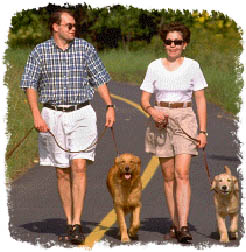 The joke goes that humans end up resembling their pets. But it looks increasingly like animals are having the last laugh as they too pile on weight to match their owners' bulging waistlines. My first cat was no exception. When it was a kitten it was a fun-loving, hyperactive, ball of energy. But then came the change of life - you know - neutering. After that, the only time she seemed to have any energy was when she was eating. And she always wanted to eat. Regardless of how much I restricted what she ate, she still seemed to manage to pile on the pounds. Yet it wasn't greediness that caused her change in behaviour - removal of her ovaries had triggered the menopause, suppressing her metabolism and increasing the sensation of hunger. Indeed these symptoms are mirrored by many women after their menstrual periods stop.
The joke goes that humans end up resembling their pets. But it looks increasingly like animals are having the last laugh as they too pile on weight to match their owners' bulging waistlines. My first cat was no exception. When it was a kitten it was a fun-loving, hyperactive, ball of energy. But then came the change of life - you know - neutering. After that, the only time she seemed to have any energy was when she was eating. And she always wanted to eat. Regardless of how much I restricted what she ate, she still seemed to manage to pile on the pounds. Yet it wasn't greediness that caused her change in behaviour - removal of her ovaries had triggered the menopause, suppressing her metabolism and increasing the sensation of hunger. Indeed these symptoms are mirrored by many women after their menstrual periods stop.
 The ovaries produce a number of different female hormones, the most well known being oestrogen and progesterone. During the human menstrual cycle, which lasts about 28 days, the levels of a number of key hormones, including oestrogen, build up during the month until a peak threshold is reached and an egg (ovum) is released. As well as controlling the maturation of the egg and the preparation of the uterus to receive an embryo, these hormones also help to regulate how hungry you feel (known as satiety), and much of your food is converted into fat (adipose tissue).
The ovaries produce a number of different female hormones, the most well known being oestrogen and progesterone. During the human menstrual cycle, which lasts about 28 days, the levels of a number of key hormones, including oestrogen, build up during the month until a peak threshold is reached and an egg (ovum) is released. As well as controlling the maturation of the egg and the preparation of the uterus to receive an embryo, these hormones also help to regulate how hungry you feel (known as satiety), and much of your food is converted into fat (adipose tissue).
 Immediately after ovulation, when an egg is released, the levels of these hormones drop temporarily, making some women feel ravenous, develop food cravings, and gain weight. It makes sense, of course, to coordinate the timing of fertility and changes in appetite. If the body is going to lug around another human being for forty weeks, it had better have enough energy deposits to feed it. And that means eating more food and storing the excess as fat, which is the most efficient way for the body to store energy.
Immediately after ovulation, when an egg is released, the levels of these hormones drop temporarily, making some women feel ravenous, develop food cravings, and gain weight. It makes sense, of course, to coordinate the timing of fertility and changes in appetite. If the body is going to lug around another human being for forty weeks, it had better have enough energy deposits to feed it. And that means eating more food and storing the excess as fat, which is the most efficient way for the body to store energy.
Oestrogen is also made in the cortex (outer part) of the adrenal gland, placenta, and adipose tissue, but the main sources of this hormone are the ovaries. So when a women goes into the menopause, her oestrogen levels plummet because there are no more eggs to release. Similarly, when female animals are neutered they no longer have ovaries and cannot produce sufficient levels of oestrogen. With lower levels of oestrogen the brain takes longer to realise the stomach is full, and at the same time cells require less food to function, so it's much easier to eat more than you should, and gain weight.
This does not mean that my cat, or a post-menopausal woman for that matter, should automatically become obese. Humans, and other animals, both gain weight the same way - by taking in more calories than they burn. In fact, a recent National Research Council study shows that 25% of pets are overweight, and obese pet-owners are more likely to have overweight and / or diabetic pets. It seems that humans in the habit of eating more than they should also pile the food tray high for their beloved Fluffy or Rover as well. And those that exercise little tend not to take their dogs on walks - perhaps because this would involve the effort of having to walk them!
It's worth bearing in mind, though, that whilst hormones can change our perception of hunger and food satisfaction, a psychologically enforced change in behaviour can change a whole lifestyle. So walk the dog before it is too late for both of you !











Comments
Add a comment